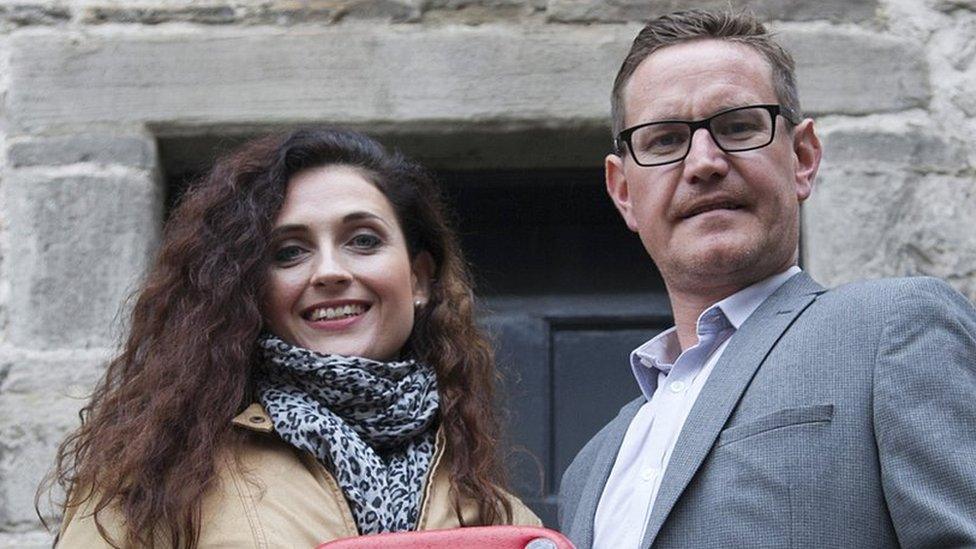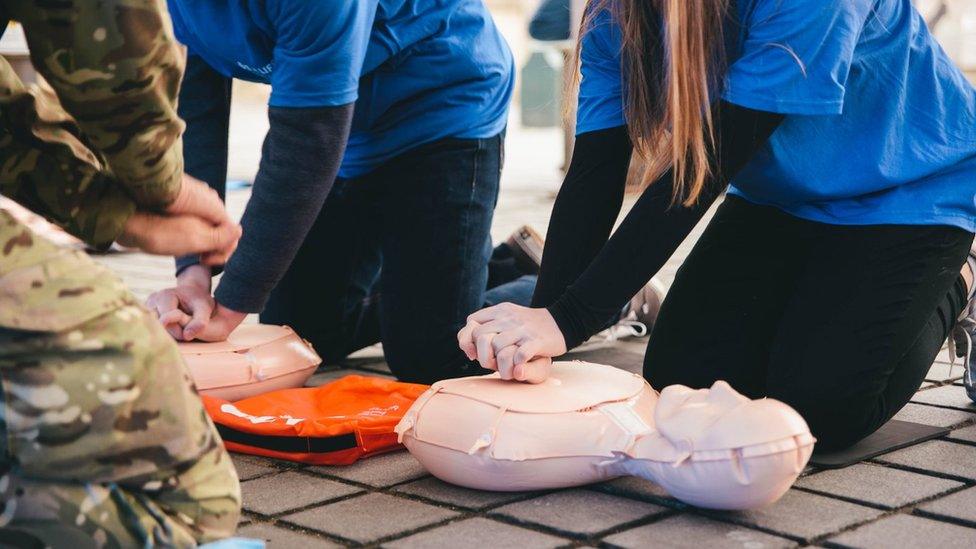'I had a cardiac arrest and a vet saved my life'
- Published

Henrietta Linnemann saved Mike Pinkerton's life
When Mike Pinkerton called in at his local vet to pick up some food for his cat, Chewie, little did he know that he would be the one receiving treatment.
His day had begun like any normal Saturday.
An hour earlier, he had taken his four-year-old son Joel to Cramond Pier, north of Edinburgh, to test out a Spiderman bike he'd received as a birthday gift during the week.
He doesn't remember anything about what happened at the vet's surgery, but he knows he is lucky to be alive.
Mr Pinkerton collapsed as he suffered a cardiac arrest - meaning his heart stopped pumping blood and he stopped breathing - and would have died there, had it not been for Henrietta Linnemann.
The vet performed CPR on him for about eight minutes before a community first responder, sent by the Scottish Ambulance Service, arrived to help. An ambulance arrived soon after.
'Feeling absolutely fine'
Mike ended up receiving CPR for about 20 minutes and paramedics shocked him four times. Doctors say his odds of survival were 5%.
Mr Pinkerston told BBC radio's Good Morning Scotland programme there had been no sign his heart was about to stop beating.
"No warning, no symptoms at all, completely out of the blue. I had been feeling absolutely fine. I'm sure if I hadn't, I wouldn't have been buying cat food."
He was later diagnosed with cardiomyopathy, external, a type of heart disease where the heart muscle becomes stretched or stiff.
Three years on, doctors say he could not have wished for a better outcome.
Just weeks before Ms Linnemann saved his life, he had learned he was to become a dad for a second time. Without her, he says he would never have met his daughter, Mae.
Mr Pinkerton added: "I go in for regular check-ups. My cardiologist has said to me I couldn't possibly have asked to have been in a better position given what happened to me and of course I've got Henrietta and the emergency services to thank for that."
The 43-year-old is one of a growing number of people who survive after having a cardiac arrest outside hospital in Scotland.
A report shows that the number of people receiving CPR before paramedics arrived has reached a record high.

Save a Life for Scotland have trained 500,000 Scots to deliver CPR
According to data from the Scottish government's Out-of-Hospital Cardiac Arrest (OHCA) report, an average of 3,200 people experience a cardiac arrest.
The latest figures show CPR (cardiopulmonary resuscitation) was performed on 64% of people who suffered a cardiac arrest in Scotland outside of hospital or before paramedics arrived last year - the highest level on record.
It has risen from a figure of 41% in 2015, when a new strategy was launched.
Back then, the survival rate was one in 20. But now, for the first time, more than one person in 10 who suffers a cardiac arrest outside of hospital is surviving and leaving hospital.
Since October 2015, almost 520,000 people have received training on how to resuscitate someone through the Save a Life for Scotland partnership - with chest compressions described in the report as "the most important modifiable factor determining survival after OHCA".
An amazing achievement
Public Health Minister Joe FitzPatrick said the rise in people equipped with the skills to perform CPR "bodes well for the future".
He added: "Swiftly starting CPR can increase the likelihood of survival after cardiac arrest by two or three times so increasing the number of bystanders who can perform CPR is vitally important."
Lisa MacInnes, from Save a Life for Scotland, said: "In October 2015, we set out to raise awareness of cardiac arrest and help people living in Scotland get CPR ready. At the time, the target of reaching 500,000 seemed a long way off.
"However, with the hard work and dedication of the fantastic Save a Life for Scotland partnership we have surpassed this milestone over a year ahead of schedule and we're keeping on counting, aiming to reach as many people as we can.
"That hard work has paid off, our bystander CPR rate has increased and most importantly now one in 10 people will be going home to their families.
"This amazing achievement belongs to every person who helped spread the life-saving message of CPR across communities throughout Scotland and especially the 500,000 people in Scotland who took time to stop and learn."